Behold, even I, even I am Beatrice.
(Div. Com. Purg. xxx.)
OF Florence and of Beatrice
Servant and singer from of old,
O’er Dante’s heart in youth had toll’d
The knell that gave his Lady peace;
And now in manhood flew the dart
Wherewith his City pierced his heart.
Yet if his Lady’s home above
Was Heaven, on earth she filled his soul;
And if his City held control
To cast the body forth to rove,
The soul could soar from earth’s vain throng,
And Heaven and Hell fulfil the song.
Follow his feet’s appointed way;—
But little light we find that clears
The darkness of the exiled years.
Follow his spirit’s journey:—nay,
What fires are blent, what winds are blown
On paths his feet may tread alone?
Yet of the twofold life he led
In chainless thought and fettered will
Some glimpses reach us,—somewhat still
Of the steep stairs and bitter bread,—
Of the soul’s quest whose stern avow
For years had made him haggard now.
Alas! the Sacred Song whereto
Both heaven and earth had set their hand
Not only at Fame’s gate did stand
Knocking to claim the passage through,
But toiled to ope that heavier door
Which Florence shut for evermore.
Shall not his birth’s baptismal Town
One last high presage yet fulfil,
And at that font in Florence still
His forehead take the laurel-crown?
O God! or shall dead souls deny
The undying soul its prophecy?
Aye, ‘tis their hour. Not yet forgot
The bitter words he spoke that day
When for some great charge far away
Her rulers his acceptance sought.
“And if I go, who stays?”—so rose
His scorn:—“and if I stay, who goes?”
“Lo! thou art gone now, and we stay”
(The curled lips mutter): “and no star
Is from thy mortal path so far
As streets where childhood knew the way.
To Heaven and Hell thy feet may win,
But thine own house they come not in.”
Therefore, the loftier rose the song
To touch the secret things of God,
The deeper pierced the hate that trod
On base men’s track who wrought the wrong;
Till the soul’s effluence came to be
Its own exceeding agony.
Arriving only to depart,
From court to court, from land to land,
Like flame within the naked hand
His body bore his burning heart
That still on Florence strove to bring
God’s fire for a burnt offering.
Even such was Dante’s mood, when now,
Mocked for long years with Fortune’s sport,
He dwelt at yet another court,
There where Verona’s knee did bow
And her voice hailed with all acclaim
Can Grande della Scala’s name.
As that lord’s kingly guest awhile
His life we follow; through the days
Which walked in exile’s barren ways,—
The nights which still beneath one smile
Heard through all spheres one song increase,—
“Even I, even I am Beatrice.”
At Can La Scala’s court, no doubt,
Due reverence did his steps attend;
The ushers on his path would bend
At ingoing as at going out;
The penmen waited on his call
At council-board, the grooms in hall.
And pages hushed their laughter down,
And gay squires stilled the merry stir,
When he passed up the dais-chamber
With set brows lordlier than a frown;
And tire-maids hidden among these
Drew close their loosened bodices.
Perhaps the priests, (exact to span
All God’s circumference,) if at whiles
They found him wandering in their aisles,
Grudged ghostly greeting to the man
By whom, though not of ghostly guild,
With Heaven and Hell men’s hearts were fill’d.
And the court-poets (he, forsooth,
A whole world’s poet strayed to court!)
Had for his scorn their hate’s retort.
He’d meet them flushed with easy youth,
Hot on their errands. Like noon-flies
They vexed him in the ears and eyes.
But at this court, peace still must wrench
Her chaplet from the teeth of war:
By day they held high watch afar,
At night they cried across the trench;
And still, in Dante’s path, the fierce
Gaunt soldiers wrangled o’er their spears.
But vain seemed all the strength to him,
As golden convoys sunk at sea
Whose wealth might root out penury:
Because it was not, limb with limb,
Knit like his heart-strings round the wall
Of Florence, that ill pride might fall.
Yet in the tiltyard, when the dust
Cleared from the sundered press of knights
Ere yet again it swoops and smites,
He almost deemed his longing must
Find force to yield that multitude
And hurl that strength the way he would.
How should he move them,—fame and gain
On all hands calling them at strife?
He still might find but his one life
To give, by Florence counted vain;
One heart the false hearts made her doubt,
One voice she heard once and cast out.
Oh! if his Florence could but come,
A lily-sceptred damsel fair,
As her own Giotto painted her
On many shields and gates at home,—
A lady crowned, at a soft pace
Riding the lists round to the dais:
Till where Can Grande rules the lists,
As young as Truth, as calm as Force,
She draws her rein now, while her horse
Bows at the turn of the white wrists;
And when each knight within his stall
Gives ear, she speaks and tells them all:
All the foul tale,—truth sworn untrue
And falsehood’s triumph. All the tale?
Great God! and must she not prevail
To fire them ere they heard it through,—
And hand achieve ere heart could rest
That high adventure of her quest?
How would his Florence lead them forth,
Her bridle ringing as she went;
And at the last within her tent,
‘Neath golden lilies worship-worth,
How queenly would she bend the while
And thank the victors with her smile!
Also her lips should turn his way
And murmur: “O thou tried and true,
With whom I wept the long years through!
What shall it profit if I say,
Thee I remember? Nay, through thee
All ages shall remember me.”
Peace, Dante, peace! The task is long,
The time wears short to compass it.
Within thine heart such hopes may flit
And find a voice in deathless song:
But lo! as children of man’s earth,
Those hopes are dead before their birth.
Fame tells us that Verona’s court
Was a fair place. The feet might still
Wander for ever at their will
In many ways of sweet resort;
And still in many a heart around
The Poet’s name due honour found.
Watch we his steps. He comes upon
The women at their palm-playing.
The conduits round the gardens sing
And meet in scoops of milk-white stone,
Where wearied damsels rest and hold
Their hands in the wet spurt of gold.
One of whom, knowing well that he,
By some found stern, was mild with them,
Would run and pluck his garment’s hem,
Saying, “Messer Dante, pardon me,”—
Praying that they might hear the song
Which first of all he made, when young.
“Donne che avete” . . . Thereunto
Thus would he murmur, having first
Drawn near the fountain, while she nurs’d
His hand against her side: a few
Sweet words, and scarcely those, half said:
Then turned, and changed, and bowed his head.
For then the voice said in his heart,
“Even I, even I am Beatrice”;
And his whole life would yearn to cease:
Till having reached his room, apart
Beyond vast lengths of palace-floor,
He drew the arras round his door.
At such times, Dante, thou hast set
Thy forehead to the painted pane
Full oft, I know; and if the rain
Smote it outside, her fingers met
Thy brow; and if the sun fell there,
Her breath was on thy face and hair.
Then, weeping, I think certainly
Thou hast beheld, past sight of eyne,—
Within another room of thine
Where now thy body may not be
But where in thought thou still remain’st,—
A window often wept against:
The window thou, a youth, hast sought,
Flushed in the limpid eventime,
Ending with daylight the day’s rhyme
Of her; where oftenwhiles her thought
Held thee—the lamp untrimmed to write—
In joy through the blue lapse of night.
At Can La Scala’s court, no doubt,
Guests seldom wept. It was brave sport,
No doubt, at Can La Scala’s court,
Within the palace and without;
Where music, set to madrigals,
Loitered all day through groves and halls.
Because Can Grande of his life
Had not had six-and-twenty years
As yet. And when the chroniclers
Tell you of that Vicenza strife
And of strifes elsewhere,—you must not
Conceive for church-sooth he had got
Just nothing in his wits but war:
Though doubtless ‘twas the young man’s joy
(Grown with his growth from a mere boy,)
To mark his “Viva Cane!” scare
The foe’s shut front, till it would reel
All blind with shaken points of steel.
But there were places—held too sweet
For eyes that had not the due veil
Of lashes and clear lids—as well
In favour as his saddle-seat:
Breath of low speech he scorned not there
Nor light cool fingers in his hair.
Yet if the child whom the sire’s plan
Made free of a deep treasure-chest
Scoffed it with ill-conditioned jest,—
We may be sure too that the man
Was not mere thews, nor all content
With lewdness swathed in sentiment.
So you may read and marvel not
That such a man as Dante—one
Who, while Can Grande’s deeds were done,
Had drawn his robe round him and thought—
Now at the same guest-table far’d
Where keen Uguccio wiped his beard.
Through leaves and trellis-work the sun
Left the wine cool within the glass,—
They feasting where no sun could pass:
And when the women, all as one,
Rose up with brightened cheeks to go,
It was a comely thing, we know.
But Dante recked not of the wine;
Whether the women stayed or went,
His visage held one stern intent:
And when the music had its sign
To breathe upon them for more ease,
Sometimes he turned and bade it cease.
And as he spared not to rebuke
The mirth, so oft in council he
To bitter truth bore testimony:
And when the crafty balance shook
Well poised to make the wrong prevail,
Then Dante’s hand would turn the scale.
And if some envoy from afar
Sailed to Verona’s sovereign port
For aid or peace, and all the court
Fawned on its lord, “the Mars of war,
Sole arbiter of life and death,”—
Be sure that Dante saved his breath.
And Can La Scala marked askance
These things, accepting them for shame
And scorn, till Dante’s guestship came
To be a peevish sufferance:
His host sought ways to make his days
Hateful; and such have many ways.
There was a Jester, a foul lout
Whom the court loved for graceless arts;
Sworn scholiast of the bestial parts
Of speech; a ribald mouth to shout
In Folly’s horny tympanum
Such things as make the wise man dumb.
Much loved, him Dante loathed. And so,
One day when Dante felt perplexed
If any day that could come next
Were worth the waiting for or no,
And mute he sat amid their din,—
Can Grande called the Jester in.
Rank words, with such, are wit’s best wealth.
Lords mouthed approval; ladies kept
Twittering with clustered heads, except
Some few that took their trains by stealth
And went. Can Grande shook his hair
And smote his thighs and laughed i’ the air.
Then, facing on his guest, he cried,—
“Say, Messer Dante, how it is
I get out of a clown like this
More than your wisdom can provide.”
And Dante: “’Tis man’s ancient whim
That still his like seems good to him.”
Also a tale is told, how once,
At clearing tables after meat,
Piled for a jest at Dante’s feet
Were found the dinner’s well-picked bones;
So laid, to please the banquet’s lord,
By one who crouched beneath the board.
Then smiled Can Grande to the rest:—
“Our Dante’s tuneful mouth indeed
Lacks not the gift on flesh to feed!”
“Fair host of mine,” replied the guest,
“So many bones you’d not descry
If so it chanced the dog were I.”
But wherefore should we turn the grout
In a drained cup, or be at strife
From the worn garment of a life
To rip the twisted ravel out?
Good needs expounding; but of ill
Each hath enough to guess his fill.
They named him Justicer-at-Law:
Each month to bear the tale in mind
Of hues a wench might wear unfin’d
And of the load an ox might draw;
To cavil in the weight of bread
And to see purse-thieves gibbeted.
And when his spirit wove the spell
(From under even to over-noon
In converse with itself alone,)
As high as Heaven, as low as Hell,—
He would be summoned and must go:
For had not Gian stabbed Giacomo?
Therefore the bread he had to eat
Seemed brackish, less like corn than tares;
And the rush-strown accustomed stairs
Each day were steeper to his feet;
And when the night-vigil was done,
His brows would ache to feel the sun.
Nevertheless, when from his kin
There came the tidings how at last
In Florence a decree was pass’d
Whereby all banished folk might win
Free pardon, so a fine were paid
And act of public penance made,—
This Dante writ in answer thus,
Words such as these: “That clearly they
In Florence must not have to say,—
The man abode aloof from us
Nigh fifteen years, yet lastly skulk’d
Hither to candleshrift and mulct.
“That he was one the Heavens forbid
To traffic in God’s justice sold
By market-weight of earthly gold,
Or to bow down over the lid
Of steaming censers, and so be
Made clean of manhood’s obloquy.
“That since no gate led, by God’s will,
To Florence, but the one whereat
The priests and money-changers sat,
He still would wander; for that still,
Even through the body’s prison-bars,
His soul possessed the sun and stars.”
Such were his words. It is indeed
For ever well our singers should
Utter good words and know them good
Not through song only; with close heed
Lest, having spent for the work’s sake
Six days, the man be left to make.
Months o’er Verona, till the feast
Was come for Florence the Free Town:
And at the shrine of Baptist John
The exiles, girt with many a priest
And carrying candles as they went,
Were held to mercy of the saint.
On the high seats in sober state,—
Gold neck-chains range o’er range below
Gold screen-work where the lilies grow,—
The Heads of the Republic sate,
Marking the humbled face go by
Each one of his house-enemy.
And as each proscript rose and stood
From kneeling in the ashen dust
On the shrine-steps, some magnate thrust
A beard into the velvet hood
Of his front colleague’s gown, to see
The cinders stuck in the bare knee.
Tosinghi passed, Manelli passed,
Rinucci passed, each in his place;
But not an Alighieri’s face
Went by that day from first to last
In the Republic’s triumph; nor
A foot came home to Dante’s door.
(RESPUBLICA—a public thing:
A shameful shameless prostitute,
Whose lust with one lord may not suit,
So takes by turn its revelling
A night with each, till each at morn
Is stripped and beaten forth forlorn,
And leaves her, cursing her. If she,
Indeed, have not some spice-draught, hid
In scent under a silver lid,
To drench his open throat with—he
Once hard asleep; and thrust him not
At dawn beneath the stairs to rot.
Such this Republic!—not the Maid
He yearned for; she who yet should stand
With Heaven’s accepted hand in hand,
Invulnerable and unbetray’d:
To whom, even as to God, should be
Obeisance one with Liberty.)
Years filled out their twelve moons, and ceased
One in another; and alway
There were the whole twelve hours each day
And each night as the years increased;
And rising moon and setting sun
Beheld that Dante’s work was done.
What of his work for Florence? Well
It was, he knew, and well must be.
Yet evermore her hate’s decree
Dwelt in his thought intolerable:—
His body to be burned,*—his soul
To beat its wings at hope’s vain goal.
What of his work for Beatrice?
Now well-nigh was the third song writ,—
The stars a third time sealing it
With sudden music of pure peace:
For echoing thrice the threefold song,
The unnumbered stars the tone prolong.†
Each hour, as then the Vision pass’d,
He heard the utter harmony
Of the nine trembling spheres, till she
Bowed her eyes towards him in the last,
So that all ended with her eyes,
Hell, Purgatory, Paradise.
“It is my trust, as the years fall,
To write more worthily of her
Who now, being made God’s minister,
Looks on His visage and knows all.”
Such was the hope that love dar’d blend
With grief’s slow fires, to make an end
Of the “New Life,” his youth’s dear book:
Adding thereunto: “In such trust
I labour, and believe I must
Accomplish this which my soul took
In charge, if God, my Lord and hers,
Leave my life with me a few years.”
The trust which he had borne in youth
Was all at length accomplished. He
At length had written worthily—
Yea even of her; no rhymes uncouth
‘Twixt tongue and tongue; but by God’s aid
The first words Italy had said.
Ah! haply now the heavenly guide
Was not the last form seen by him:
But there that Beatrice stood slim
And bowed in passing at his side,
For whom in youth his heart made moan
Then when the city sat alone Quomodo sedet sola civitas!
—The words quoted by Dante in the Vita Nuova when
he speaks of the death of Beatrice.
Clearly herself: the same whom he
Met, not past girlhood, in the street,
Low-bosomed and with hidden feet;
And then as woman perfectly,
In years that followed, many an once,—
And now at last among the suns
In that high vision. But indeed
It may be memory might recall
Last to him then the first of all,—
The child his boyhood bore in heed
Nine years. At length the voice brought peace,—
“Even I, even I am Beatrice.”
All this, being there, we had not seen.
Seen only was the shadow wrought
On the strong features bound in thought;
The vagueness gaining gait and mien;
The white streaks gathering clear to view
In the burnt beard the women knew.
For a tale tells that on his track,
As through Verona’s streets he went,
This saying certain women sent:—
“Lo, he that strolls to Hell and back
At will! Behold him, how Hell’s reek
Has crisped his beard and singed his cheek.”
“Whereat” (Boccaccio’s words) “he smiled
For pride in fame.” It might be so:
Nevertheless we cannot know
If haply he were not beguiled
To bitterer mirth, who scarce could tell
If he indeed were back from Hell.
So the day came, after a space,
When Dante felt assured that there
The sunshine must lie sicklier
Even than in any other place,
Save only Florence. When that day
Had come, he rose and went his way.
He went and turned not. From his shoes
It may be that he shook the dust,
As every righteous dealer must
Once and again ere life can close:
And unaccomplished destiny
Struck cold his forehead, it may be.
No book keeps record how the Prince
Sunned himself out of Dante’s reach,
Nor how the Jester stank in speech:
While courtiers, used to cringe and wince,
Poets and harlots, all the throng,
Let loose their scandal and their song.
No book keeps record if the seat
Which Dante held at his host’s board
Were sat in next by clerk or lord,—
If leman lolled with dainty feet
At ease, or hostage brooded there,
Or priest lacked silence for his prayer.
Eat and wash hands, Can Grande;—scarce
We know their deeds now: hands which fed
Our Dante with that bitter bread;
And thou the watch-dog of those stairs
Which, of all paths his feet knew well,
Were steeper found than Heaven or Hell.
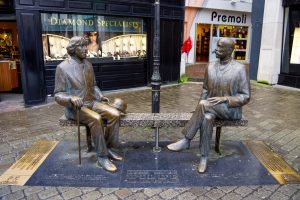
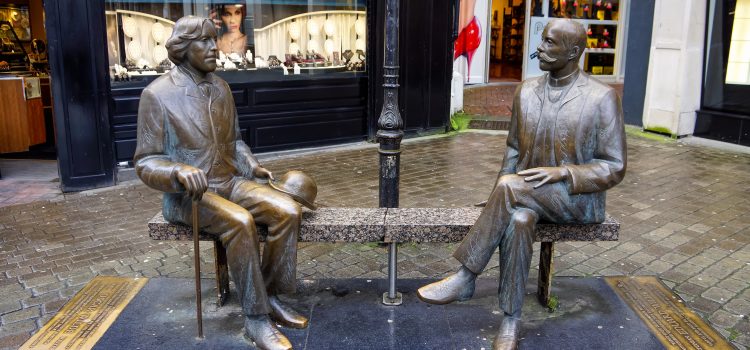
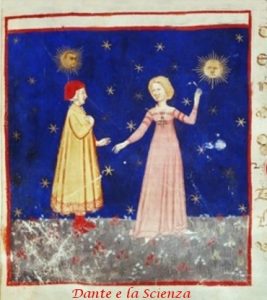
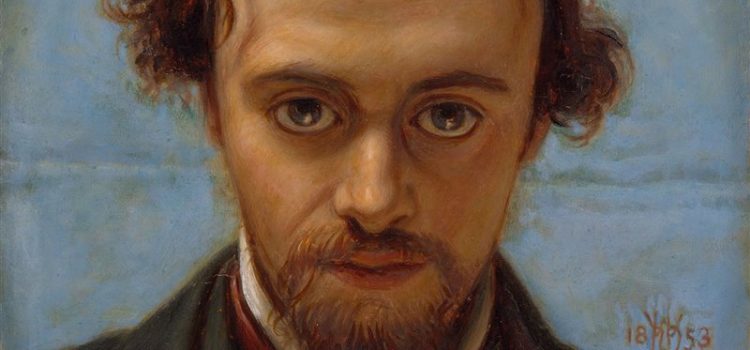
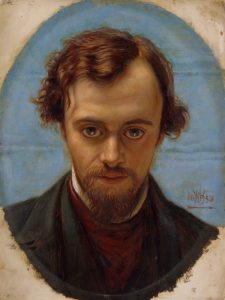 Dante At Verona Poem by Dante Gabriel Rossetti
Dante At Verona Poem by Dante Gabriel Rossetti